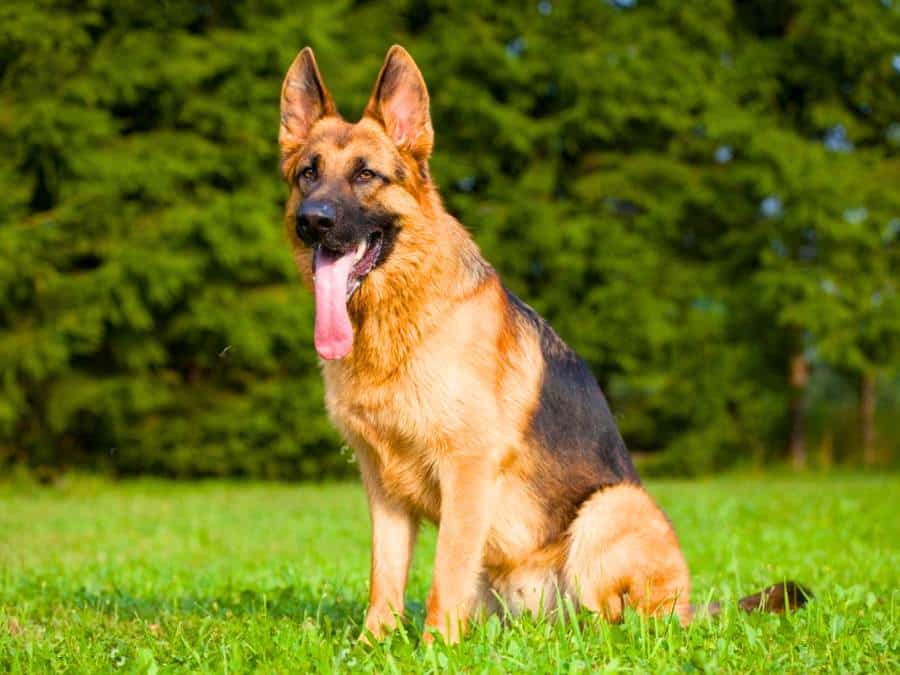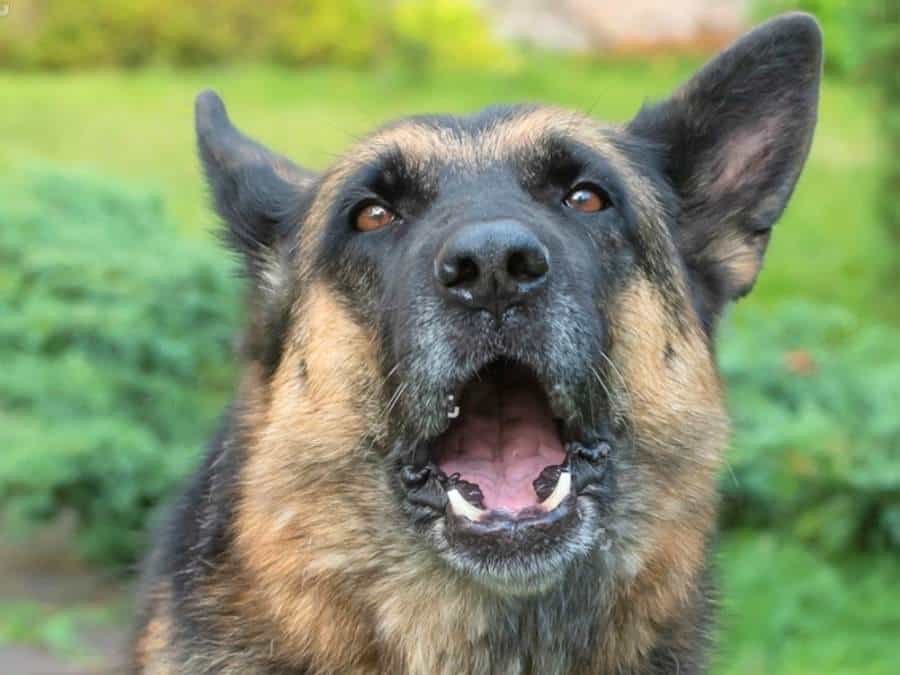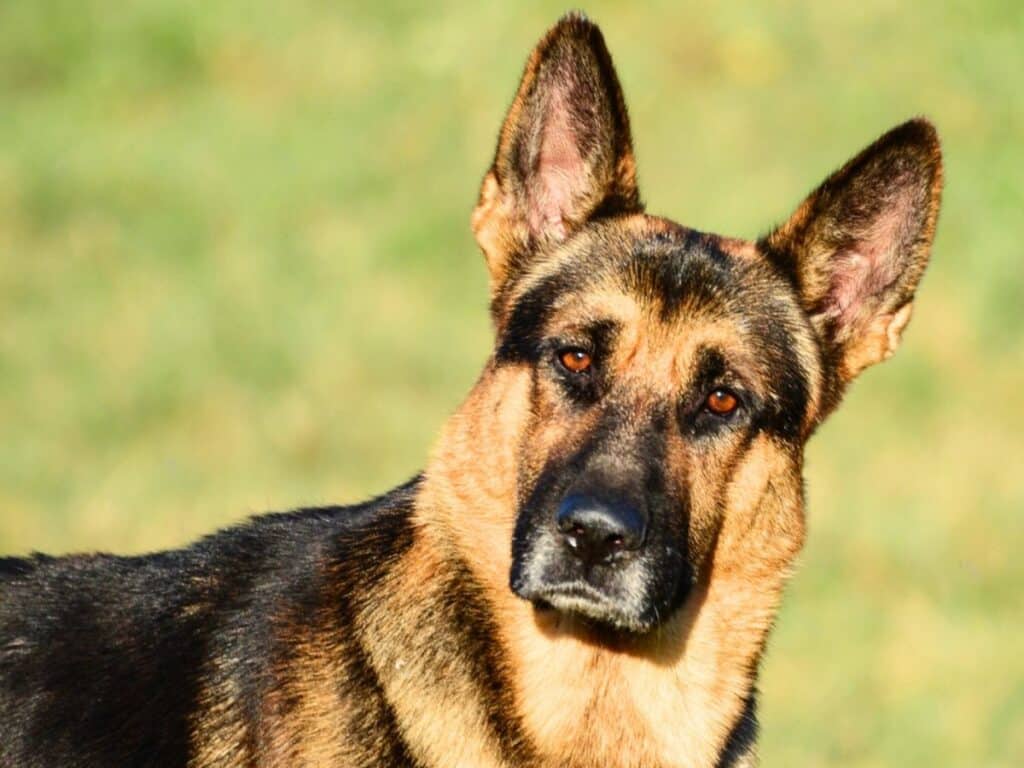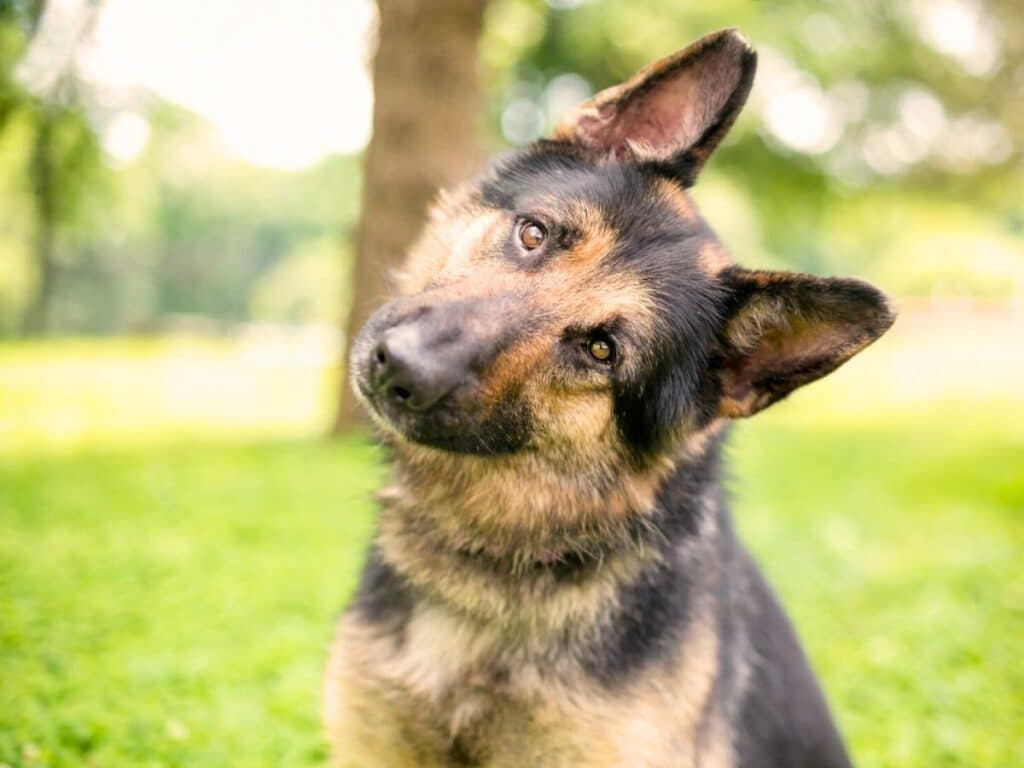Is your German Shepherd panting more than they usually do? German Shepherds normally pant to regulate their body temperature, but you may be wondering why your dog seems to pant so much more.
Keep reading as I talk about the 9 reasons for German Shepherd panting, when it’s normal or abnormal, and how to manage it when it seems excessive.
Why Is My German Shepherd Panting So Much?
Dogs pant for a variety of reasons, but the most common reason is to regulate their body temperature. Dogs don’t sweat through their skin like humans do, so they rely on panting to help them cool down.
Here are 9 reasons your German Shepherd may be panting.
- They are cooling off.
- They may be recovering after a burst of activity.
- They are excited.
- They are stressed, anxious, or scared.
- They may be having a heatstroke.
- They may be in pain.
- They have heart problems.
- They may be old or obese.
- They may be having an allergic reaction.
Now let’s take a more in-depth look at each reason your GSD may be panting.
1. To cool off.
Panting in dogs is a cooling mechanism. Unlike humans, dogs don’t sweat much through their skin. Instead, they rely on panting as their primary means of cooling down. (Source)
When a German Shepherd pants, moisture evaporates from their tongue, mouth, and lungs, which helps to dissipate heat from their body.
Additionally, the rapid breathing associated with panting helps to increase airflow over the moist surfaces of their mouth, facilitating further cooling.
As the German Shepherd exhales warm air and inhales cooler air, heat is transferred out of the body. This exchange of air helps to maintain a balance between the dog’s internal body temperature and the temperature of its surroundings.
This mechanism is especially crucial for German Shepherds because they can easily overheat particularly in hot or humid weather or during periods of vigorous activity.
2. To recover after a burst of activity.
After a burst of activity, such as intense play or exercise, German Shepherds often resort to panting as a means of recovering and regulating their body temperature.

When a German Shepherd exerts itself, its muscles generate heat, and panting serves as a mechanism to release this heat, preventing overheating and potential heatstroke.
Through rapid and shallow breaths, dogs increase airflow across their tongue, mouth, and respiratory tract, facilitating heat exchange with the environment.
Additionally, panting helps dogs expel excess carbon dioxide and regulate their oxygen intake, aiding in the restoration of normal physiological functions.
3. They are excited.
When a German Shepherd is thrilled or eagerly anticipating something, whether it’s a game of fetch, the arrival of their favorite human, or the prospect of a walk, they may pant as a form of expression.
This panting is a physiological response to heightened arousal, similar to how humans might feel butterflies in their stomachs or an increased heart rate when excited.
It’s their way of releasing excess energy and preparing their bodies for action.
4. They are stressed, anxious, or scared.
When dogs experience stress, anxiety, or fear, panting can manifest as a physical response to their heightened emotional state.
In situations that trigger fear or anxiety, the German Shepherd’s body may tense up, their ears may flatten against their head, and they may exhibit behaviors like pacing, trembling, or attempting to hide.
Alongside these behavioral cues, panting can emerge as a subtle yet telling sign of their distress.
The panting in stressed or anxious dogs is typically more rapid and shallow compared to panting from excitement or physical exertion.
The dog may also exhibit other signs of discomfort or distress, such as lip licking, yawning, or avoidance behaviors.
5. They may be having a heatstroke.
While all dogs can overheat, German Shepherds are especially susceptible to heatstroke. This is due to their long fur coats, which can trap heat and make it difficult for them to cool down.

Heat stroke occurs when a dog’s body temperature rises to dangerous levels, typically as a result of prolonged exposure to high temperatures or strenuous exercise in hot weather.
In cases of heat stroke, panting becomes increasingly frantic and may appear more labored as the dog struggles to dissipate excess heat.
The panting may be accompanied by other signs of heat stroke, including excessive drooling, weakness, collapse, vomiting, and seizures.
6. They may be in pain.
When dogs are in pain, panting can be one of the ways they communicate their discomfort. Unlike panting due to excitement or heat regulation, panting caused by pain tends to be more irregular, shallow, and may occur even when the dog is at rest.
Pain can trigger an increase in heart rate and respiratory rate as the body responds to the distress signals. This heightened physiological state may lead to panting as the dog’s body attempts to cope with the pain.
If you notice any of the other signs accompanying abnormal panting, your dog could be in pain:
- Decreased appetite
- Lethargy and no interest in activities
- Decreased mobility
- Whining or moaning
- Changes in behavior such as snapping or growling
Limping, vomiting, and diarrhea are other symptoms that could indicate your dog is battling pain and is feeling traumatized.
7. They have heart problems.
Heart issues in German Shepherds, such as congestive heart failure or heart disease, can disrupt the normal functioning of the cardiovascular system, leading to changes in respiratory patterns including panting.
Dogs with heart problems may pant more frequently, especially during periods of rest or minimal activity, as their heart struggles to pump blood efficiently throughout their body.
This panting may be accompanied by other signs of heart disease, such as coughing, lethargy, difficulty breathing, and decreased tolerance for exercise.
Additionally, dogs with heart problems may exhibit a distinctive type of panting known as “air hunger,” characterized by rapid, shallow breaths as the body attempts to compensate for reduced oxygenation.
8. They may be old or obese.
Older German Shepherds may pant more frequently as their bodies undergo natural aging processes, which can include reduced cardiovascular function and decreased lung capacity.

Similarly, obesity can place additional strain on a dog’s respiratory and cardiovascular systems, leading to increased panting as the body works harder to meet its oxygen needs.
In both cases, panting may occur more readily during physical exertion or in response to heat, as aging and obesity can decrease a dog’s tolerance for exercise and impair their ability to regulate body temperature efficiently.
9. They may be having an allergic reaction.
If your German Shepherd often goes for walks in the local dog park or spends time playing games in your garden, they could be exposed to environmental allergens.
These include dust, mold, and pollen, which are seasonal but can cause your dog to have uncomfortable symptoms.
Food allergens can also cause itchy skin or unpleasant gastrointestinal problems, while bee stings and vaccines can lead to severe allergic reactions.
While increased panting could be one symptom of dog allergies, others include the following:
- Itchiness and excessive scratching or rubbing
- Hives and swelling of body areas such as the face
- Sneezing or coughing
- Chronic ear or eye infections
- Constant licking
All of the above-mentioned symptoms are enough to make your dog pant more frequently.
Normal Panting vs Abnormal Panting
Since German Shepherds do pant more than other breeds, how can you tell whether your dog is panting an average amount or not?
Here are a few differences between normal panting and abnormal excessive panting:
| Aspect | Normal Panting | Abnormal Panting |
|---|---|---|
| Context and Trigger | Occurs in response to physical exertion, heat, excitement, or stressors like car rides or vet visits. | May occur suddenly or persistently without an obvious cause or trigger. |
| Duration and Frequency | Brief and intermittent, subsides with rest and cooling down. | Prolonged, continuous, or occurring at inappropriate times. |
| Intensity and Pattern | Moderate intensity with regular, rhythmic breaths. | More intense, rapid, shallow, or labored; irregular pattern. |
| Environmental Factors | Expected in hot or humid weather, decreases in cooler environments. | Persists or worsens despite changes in temperature or activity level. |
| Underlying Health Conditions | Generally not indicative of underlying health issues. | Can be a symptom of pain, respiratory problems, heart disease, anxiety, etc. |
| Accompanying Symptoms | Typically not accompanied by other concerning symptoms. | May be accompanied by signs of discomfort, distress, or other health issues. |
| Monitoring and Observation | Pay attention to panting patterns over time. | Note changes or abnormalities and seek veterinary attention if necessary. |

When is Panting a Cause for Concern?
Panting in German Shepherds is usually a normal and healthy behavior, but there are certain situations where it can be a cause for concern.
Here are some scenarios when panting may indicate an underlying issue:
- Excessive Panting: If your dog is panting excessively, especially when they haven’t been active or in cool temperatures, it could be a sign of an underlying health problem such as pain, stress, anxiety, respiratory issues, or heatstroke.
- Labored Panting: Panting that appears labored, shallow, or accompanied by wheezing, coughing, or other respiratory distress may indicate respiratory problems, heart disease, or other serious medical conditions.
- Changes in Panting Patterns: Significant changes in your dog’s panting patterns, such as sudden onset or a marked increase in frequency, intensity, or duration, could signal a health issue that requires attention.
- Panting in Senior Dogs: While some panting is normal in older dogs, excessive panting in senior dogs may indicate pain, discomfort, or age-related health issues such as arthritis, heart disease, or respiratory problems.
- Panting with Other Symptoms: Panting accompanied by other concerning symptoms such as lethargy, loss of appetite, vomiting, diarrhea, trembling, weakness, or collapse may indicate a medical emergency and requires immediate veterinary attention.
- Panting in Specific Situations: Panting in situations where it’s unusual or unexpected, such as during rest, mild activity, or in cool environments, may suggest an underlying health issue, stress, anxiety, or pain.
- Persistent Panting: If your dog continues to pant excessively or persistently over an extended period, despite efforts to address potential triggers such as heat or stress, it may indicate an underlying medical condition that requires evaluation by a veterinarian.
- Breathing Difficulty: If your dog exhibits signs of difficulty breathing, such as open-mouth breathing, gasping, or struggling to catch their breath, it could be a sign of a respiratory or cardiac problem, and immediate veterinary attention is necessary.
If you’re ever unsure whether your dog’s panting is normal or indicative of a health problem, it’s always best to err on the side of caution and consult with a veterinarian for proper evaluation and guidance. Early detection and intervention can help address underlying health issues and ensure the well-being of your furry companion.

What To Do When Your German Shepherd Is Panting Excessively?
When your German Shepherd is panting excessively, it’s essential to assess the situation and take appropriate steps to ensure their comfort and well-being.
Here’s what to do when your GSD is panting:
- Check the Environment: Determine if your dog is panting due to environmental factors such as heat or humidity. If so, move your dog to a cooler area with shade or air conditioning to help them cool down.
- Offer Water: Provide your dog with access to fresh, cool water to help them stay hydrated. Encourage them to drink, especially if they’ve been active or exposed to warm temperatures.
- Monitor Activity: If your dog has been exercising or engaging in physical activity, allow them to rest and recover. Avoid strenuous exercise during hot weather, and provide opportunities for your dog to rest and cool off as needed.
- Observe for Signs of Distress: Pay attention to your dog’s behavior and body language. If they seem distressed, restless, or uncomfortable, it’s essential to investigate further and address any underlying issues.
- Check for Other Symptoms: Look for additional signs of health problems, such as lethargy, vomiting, diarrhea, coughing, wheezing, or difficulty breathing. These symptoms could indicate a more serious issue requiring veterinary attention.
- Provide Comfort: Offer your dog reassurance and comfort with soothing words, gentle petting, or their favorite toys. Keeping them calm can help alleviate stress or anxiety that may be contributing to panting.
- Contact Your Veterinarian if Concerned: If your dog’s panting persists, worsens, or is accompanied by other concerning symptoms, contact your veterinarian for guidance. Describe your dog’s symptoms and follow any instructions provided by the veterinarian, which may include scheduling an appointment for an examination.
To prevent future episodes of excessive panting, avoid triggers such as heat or stress, ensure your dog has access to shade and water, and address any underlying health issues through regular veterinary care and appropriate lifestyle adjustments.
Conclusion
So, next time you see your dog panting heavily, remember the tips you’ve picked up here. Remember, your pup can’t verbally tell you when something’s wrong, so it’s up to you to pay attention and take action. Whether it’s a quick trip to the vet or providing a cool environment during hot days, your dog’s well-being is in your hands. Stay vigilant, be proactive, and keep your four-legged companion healthy and happy.
Frequently Asked Questions
1. Why is my German Shepherd panting so much at night?
Excessive panting in dogs at night could indicate discomfort, anxiety, pain, or underlying medical conditions such as heart or respiratory issues. It’s essential to monitor your dog’s behavior and consult with a veterinarian to determine the cause and appropriate course of action.
2. Is it normal for my German Shepherd to breathe fast while sleeping?
While it’s common for dogs to breathe faster during certain sleep stages, consistent or labored rapid breathing could indicate potential health issues such as respiratory problems, heart disease, or pain. If you’re concerned, consult with your veterinarian for guidance.
3. Why is my German Shepherd panting while resting?
Panting while resting can be a sign of discomfort, stress, anxiety, pain, or underlying health issues such as heatstroke, heart disease, or respiratory problems. It’s important to monitor your dog’s panting patterns and consult with a veterinarian if it persists or worsens.
4. Why won’t my German Shepherd stop panting?
Persistent panting in dogs can be a sign of underlying medical conditions such as heatstroke, pain, stress, anxiety, respiratory problems, or heart disease. If your dog won’t stop panting, especially if accompanied by other concerning symptoms, seek veterinary attention promptly.
5. When should I worry about my German Shepherd’s excessive panting?
Excessive panting in dogs should be a cause for concern if it’s persistent, intense, or accompanied by other symptoms such as lethargy, vomiting, diarrhea, coughing, wheezing, or difficulty breathing. If you’re unsure or concerned, it’s best to consult with a veterinarian for proper evaluation and guidance.
FURTHER READING:




